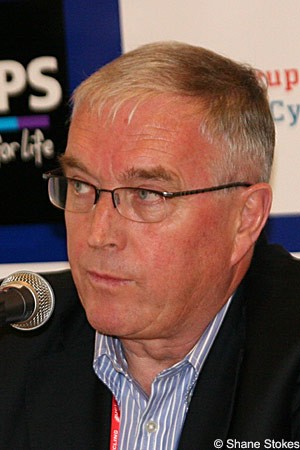UCI President sees future growth of cycling outside traditional European base
 Pat McQuaid, the President of the International Cycling Union (UCI), sees the future of cycling as a global one, even at the expense of its traditional heartland, he told French sportspaper l’Equipe. Races such as the Tour Down Under and the Tour of California should be encouraged as much as their European equivalents he believes, which means that many more established events may have to make room.
Pat McQuaid, the President of the International Cycling Union (UCI), sees the future of cycling as a global one, even at the expense of its traditional heartland, he told French sportspaper l’Equipe. Races such as the Tour Down Under and the Tour of California should be encouraged as much as their European equivalents he believes, which means that many more established events may have to make room.
“Cycling has a future in North America and Oceania, it’s obvious,” he said. “In South America there is a lot of potential with the Olympic Games in Rio in 2016 and I see the return of the Colombians. In Africa the level is rising, but the engine is Asia.”
The UCI’s World Tour (previously called the ProTour) begins with the Tour Down Under as the first event in and two Canadian one-day races come towards the end. At the next level down are a number of races on the rise including the Tours of California, Qatar, and Oman. The UCI has come under criticism from a number of quarters for this concentration on new markets meaning that it is looking to destroy the sport in Europe; McQuaid denies this.
“It’s wrong to argue that we want to kill European cycling,” he explained. “Some races are centenarians, we respect them; but our duty is equally to watch the World market… the Tour of California as well as the Giro [d’Italia]. We want to work with the organisers of the major Tours in the fight against doping.
“I think we can reduce the duration of the Giro and Vuelta [a España],” he added. “The Tour is untouchable, it’s the biggest race in the World; it’s our showcase.”
The prospect of reducing the Vuelta to less than its current three-week format is often discussed as it has often produced a number of long drawn out transition stages, and since its switch to the end of the summer, has far lower levels of fans on the road compared to other races. The Giro however, was rarely spoken of in this way as it is a fixture of the early Italian summer with the crazy tifosi packing the roadsides every day.
Now the Giro is in competition with the much newer Tour of California though (which is sponsored by Amgen, one of the World’s biggest producers of anti-cancer drugs including EPO, and was created on the wave of publicity around the Tour victories of Lance Armstrong), the Italian race must apparenty make room.
As much of the focus of the UCI moves away from Western Europe the host naton of its biggest race, now only has one team in the top level; this is on top of the fact that no French rider has won the Tour since Bernard Hinault took his fifth victory in 1985. Much of this is brought on by the French themselves though, he says, with their lack of ambition outside their own country.
“Foreign competition is stronger than before,” he said. “I think French riders are a little soft. Bernard Hinault is severe with them; well, I agree with him. I also think that the French teams are too conservative; how do you run at the highest level internationally with a national vision.”
With the apparent softness of French riders, and the conservative nature of the teams, coupled with the UCI’s apparent concentration on new markets, the immediate future does not look bright in the home of cycling’s biggest races.